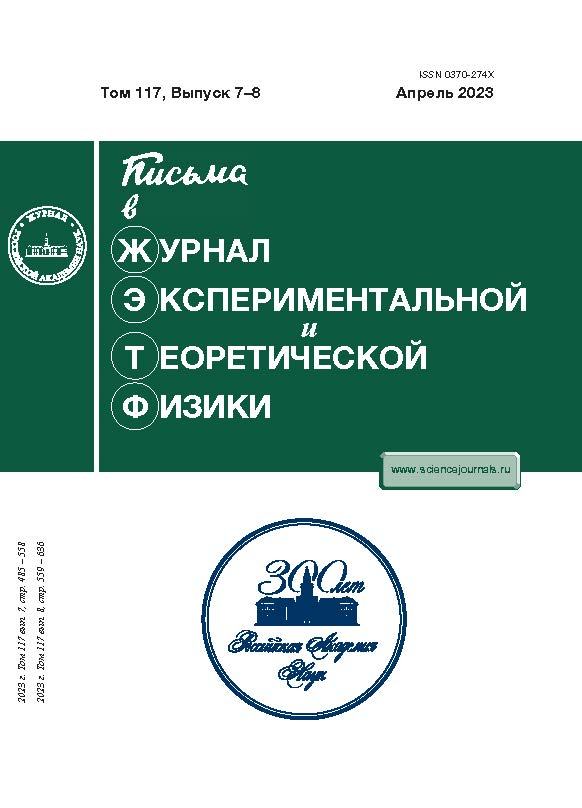Magnetic anisotropy of single-ion magnet (PPh4)2[ReF6] · 2H2O
- Autores: Taran L.S1, Elfimova V.Y2, Streltsov S.V1,2
-
Afiliações:
- M. N. Mikheev lnstitute of Metal Physics of Ural Branch of Russian Academy of Sciences
- Ural Federal University
- Edição: Volume 117, Nº 7-8 (4) (2023)
- Páginas: 612-613
- Seção: Articles
- URL: https://vestnik.nvsu.ru/0370-274X/article/view/664140
- DOI: https://doi.org/10.31857/S1234567823080086
- EDN: https://elibrary.ru/WFEXQU
- ID: 664140
Citar
Texto integral
Resumo
Studying of single-molecule magnets has sprung many surprises such as, e.g., quantum tunneling of the magnetization, which is strongly related to the presence of a magnetic anisotropy. Electron spin resonance and inelastic neutron scattering measurements of (PPh4)2[ReF6]⋅2H2O complex evidence an unprecedented large single-site magnetic anisotropy of D@35 K in this material. Using state-of-the-art ab initio calculations we found that the single-ion anisotropy is indeed very large (but does not exceed 12 K) and revealed the physical mechanism lying behind this phenomenon.
Sobre autores
L. Taran
M. N. Mikheev lnstitute of Metal Physics of Ural Branch of Russian Academy of Sciences
Email: letters@kapitza.ras.ru
V. Elfimova
Ural Federal University
Email: letters@kapitza.ras.ru
S. Streltsov
M. N. Mikheev lnstitute of Metal Physics of Ural Branch of Russian Academy of Sciences; Ural Federal University
Autor responsável pela correspondência
Email: letters@kapitza.ras.ru
Bibliografia
- V. V. Novikov and Yu. V. Nelyubina, Russ. Chem. Rev. 90, 1330 (2021); 10.1070/RCR5002.
- K. S. Pedersen, M. Sigrist, M. A. S�rensen, A.-L. Barra, T. Weyhermu�ller, S. Piligkos, C. Aa. Thuesen, M. G. Vinum, H. Mutka, H. Weihe, R. Cl'erac, and J. Bendix, Angewandte Chemie International Edition 53, 1351 (2014); 10.1002/anie.201309981.
- G. Kresse and J. Hafner, Phys. Rev. B 47, 558 (1993); 10.1103/PhysRevB.47.558.
- G. Kresse and J. Furthmu�ller, Comput. Mater. Sci. 6, 15 (1996); 10.1016/0927-0256(96)00008-0.
- G. Kresse and J. Furthmu�ller, Phys. Rev. B 54, 11169 (1996); 10.1103/PhysRevB.54.11169.
- K. Lejaeghere, G. Bihlmayer, T. Bj�orkman et al. (Collaboration), Science 351, aad3000 (2016); 10.1126/science.aad3000.
- G. Kresse and D. Joubert, Phys. Rev. B 59, 1758 (1999); 10.1103/PhysRevB.59.1758.
- J. P. Perdew, K. Burke, and M. Ernzerhof, Phys. Rev. Lett. 78, 1396 (1997); 10.1103/PhysRevLett.78.1396.
- S. L. Dudarev, G. A. Botton, S. Y. Savrasov, C. J. Humphreys, and A. P. Sutton, Phys. Rev. B 57, 1505 (1998); 10.1103/PhysRevB.57.1505.
- A. Abragam and B. Bleaney, Electron Paramagnetic Resonance of Transition Ions, Clarendon press, Oxford (1970).
- M. Vijayakumar and M. S. Gopinathan, Journal of Molecular Structure (Theochem) 361, 15 (1996).
Arquivos suplementares










